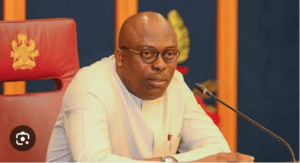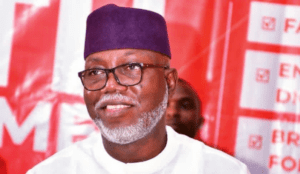Out-of-school children: We are engaging State governments to tackle bottlenecks hindering success of UBEC funds — FG
…Kicks off establishment of National Commission for Almajiri and Out-of-School Children
By Grace Olatundun
In a move to curtail the number of out-of-school children in the country, the Federal Government has stated that it has commenced engagement with state governments to tackle bottlenecks hindering the successful utilisation of the Universal Basic Education Commission (UBEC) funds.
The Universal Basic Education Programme is aimed at ensuring free education for Children at the primary school level and three years of Junior Secondary school. The program was launched in September 1999 while the law establishing UBEC was signed in 2004.
Part of the provisions of the programme is provision of funds to assist states in implementing ideals of the programme. For UBEC, 2 percent of the Cumulative Statutory releases of the country’s consolidated revenue fund is set aside to fund the programmes and projects.
A Dataphyte review of the UBEC portal shows that between 2005 and 2021, thirty two (32) states did not access over N48 billion in UBEC funds available for improving basic education across all states.
Addressing a press conference on Thursday, Nigeria’s Minister of Education, Prof. Tahir Mamman said the federal government had not only begun operationalising the establishment of the National Commission for Almajiri and Out-of-School Children but also approved a policy on Early Child Care Development Education, ECCDE, as well as commenced engagement with state governments on removing bottlenecks that negatively impacted their ability to optimally utilise the Universal Basic Education funds.
The Minister disclosed that the present administration has taken a total of 230 out-of-school children back to school.
He added that the federal government is working towards returning 15 million out-of-school children to classrooms by 2027.
Delivering a speech titled, “Short Time But Impressive Gains for Moving Education Forward,” the minister assured that the government would be paying particular attention to “this unacceptable phenomenon and in line with President Bola Ahmed Tinubu’s commitment.”
“I would not want to bother you with the number of out-of-school children in the country; suffice it to say that it is an embarrassment that Nigeria is continually associated with the highest number of out-of-school children in the world.
“We would be paying particular attention to this unacceptable phenomenon and, in line with President Bola Ahmed Tinubu’s commitment, would work towards returning 15 million out-of-school children to classrooms by the year 2027.
“A National Basic Education in Nigeria Bootcamp (BEN-B) Summit was held in September 2023 to re-invigorate our focus on basic education, including ensuring harmonisation and coordination of resources and activities amongst all tiers of government and development partners. This was followed by a National Conference on Learning Crisis in Nigeria, which has resulted in a framework of action to address identified challenges and bottlenecks to foundational learning in Nigeria.
“A national policy on senior secondary and re-entry guidelines for adolescent girls who dropped out of school prematurely has also been developed and adopted by the National Council on Education. These two policies would considerably advance our interventions for returning more Nigerian children to school.
“To do this, we are placing a high premium on foundational and basic education, strengthening integration of existing non-formal schools into formal education systems, scaling up adult literacy and non-formal education interventions, increasing opportunities for girl-child education, and forging partnerships with all tiers of government as well as our development partners.
“We have, therefore, begun operationalizing the establishment of the National Commission for Almajiri and Out-of-School Children, approved a policy on Early Child Care Development Education (ECCDE), and commenced engagement with state governments on removing bottlenecks that negatively impact their ability to optimally utilise the Universal Basic Education funds,” he said.
He explained that the briefing was designed to inform the public on what the Federal Ministry of Education has been doing under the current leadership, with the guidance of President Bola Ahmed Tinubu, since his swearing-in as Minister of the Federal Republic of Nigeria on August 17th, 2023.
“The Honourable Minister of State and I would like to use this opportunity to thank God for the opportunity to serve and also appreciate President Bola Ahmed Tinubu for the confidence reposed in us by entrusting the management of unarguably the largest and most important ministry in the country to our care.
“We both remain resolute in our conviction that once we get education right, we will get our development right and place our country back on the right trajectory. This is so because a population with the appropriate knowledge, skills, and attitude would engender a society with the right economic model for delivering services to the people.
“I also want to thank all stakeholders in the education sector and indeed all Nigerians for the support they have given us so far, and we will continue on with more of this as we march positively forward in revamping Nigerian education.
“All our strategies, implementation, and intervention are focused on the fifth priority of Mr President’s eight-point priority, which is inclusivity: drawing on all skills,” he said.
Speaking on the ministry’s strategic direction, Prof. Mamman recalled that upon assumption of office, the ministry reviewed existing strategic plans and inaugurated a committee to develop a roadmap tagged “Education for Renewed Hope Agenda: Roadmap for the Nigerian Education Sector 2024–2027,” noting that this was subjected to stakeholder review, adoption, and approval for implementation by the National Council on Education at its 67th session held on December 14 and 15, 2023.
He said, “The roadmap contains practical, problem-solving, and realistic approaches across thirteen thematic areas delineated to allow for concurrent implementation as parts of a synergistic whole.
“The Roadmap underpins the Ministerial Deliverables, a compact signed between the management of the Federal Ministry of Education and Mr President for which our tenure would be held accountable. It is also worth mentioning that the 2022-2023 Nigeria’s Annual Education Conference, which was held from September 11–12, 2023, provided an opportunity for knowledge and experience that was useful in developing the Roadmap.”
Commenting on the incorporation of technological aided learning, the Minister explained that: “We have started deepening the application of technology to the education sector by opening up discussions with the Honourable Minister of Communications and Digital Economy and engaging MasterCard in exploring innovative teaching materials, the integration of digital tools into technical education, and developing a digital public infrastructure for education through data capture, analysis, and information exchange that would be readily available and possible.
“In line with the above, we have enhanced the capacity of FME Desk Officers on Geospatial Technology for Education Technologies [GIS & GPS] Application in governance and social development planning as well as improving the capacity of Informatics and Documentation Officers on Data Gathering, Collation, Editing, and Video Coverage for effective reportage of programmes and activities in the Education Sector.
“The Ministry has also completed the full business case for establishing a national education, research, and database (NERD) system, which would be developed through a public-private sector partnership and is based on existing policies on ICT in the country.
“The NERD The National Education Repository and Databank System (NERDS) is a digital platform for the historical digitisation of all academic and educational outputs ever generated in the history of Nigeria, starting in 1932, when the first polytechnic was established, and ending in 1948, when the first university was established. Under the NERDS, the nation will go back in time to preserve its historical knowledge, mainstream live digitization for existing education documents, and set up a credential verification system for the validation of all education-related credentials.
“Similarly, we are also deepening discussions with the Nigerian Mid-Stream and Downstream Regulatory Agency (NMDRA) on finding lasting solutions to the power issues in our tertiary institutions, including the use of compressed natural gas.
“Digital resources centres have been set up, through the Universal Basic Education Commission (UBEC), for the development of electronic digital content for basic education delivery in the 37 smart schools and 111 effective other schools,” he said.




